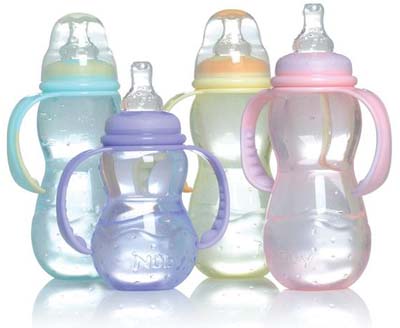Frosh Urges Expansion of BPA Ban in Children's Products

Current Maryland law prohibits BPA in sippy cups and baby bottles. The proposed bill would expand this ban to all baby food containers. (Creative Commons photo courtesy of thesoftlanding)
Thursday, Feb. 10, 2011
ANNAPOLIS, Md. –Sen. Brian E. Frosh, D-Montgomery, wants to expand the state's ban on child care products made with the chemical bisphenol-A instead of waiting on the Food and Drug Administration to issue guidelines for its regulation.
Under the proposed bill, the ban would include all containers intended to hold food or beverages for consumption by a child under the age of 4. Current law limits the ban to sippy cups and baby bottles.
"This bill expands that prohibition" to all baby food containers, including cans, jars and other products, Frosh said at a Senate Finance Committee hearing Thursday.
"Until last year, the FDA had declared BPA to be safe," he said. "The reality is, it may be years" before FDA takes action, which is why state initiatives matter, he said.
According to the National Conference of State Legislatures, 59 measures were proposed in 18 states in 2010 to address concerns about BPA, and since 2009, seven states have enacted restrictions on the chemical. Last year, the bill prohibiting sippy cups and baby bottles containing BPA passed the state Senate and the House of Delegates unanimously.
But Kathleen M. Roberts, executive director of the North American Metal Packaging Alliance Inc., believes the bill is an overreaction to incomplete research, and thinks the state needs to wait for further studies to be done before making such a move.
"Food for children under 4 is everything except beer," she said. "It's everything."
Roberts spoke against the legislation.
"The decision needs to be with the FDA," she said. "It ought to be with the public health experts."
In addition to expanding the ban, Frosh's bill would also push back the date for the Department of Health and Mental Hygiene to adopt regulations to enforce the ban to Jan. 1, 2012.
In a January 2010 report, the FDA's National Toxicology Program expressed "some concern about effects on the brain, behavior, and prostate gland in fetuses, infants, and children" as a result of BPA exposure.
The compound is commonly found in plastic products such as baby bottles and water bottles. In adults, low doses of BPA are not thought to be of concern, though research is ongoing.
Jennifer Bevin-Dangel, a mother of 10-month-old twins who testified in favor of the proposed bill, said it was "scary" not knowing what chemicals are in the containers her children may consume from.
"The science is increasingly showing it (BPA) is a toxin," she said. "Last year, I wasn't a mom. It's one of those things you don't even think about."
FDA spokesman Doug Karas said that further studies need to be done before the agency can start to regulate BPA at the federal level.
"FDA has some research going, so that's where the federal effort is right now," he said. But, he added, "a lot of companies aren't using it anymore."
Wal-Mart and Toys 'R' Us are among retailers who have begun to phase out child care products containing BPA.
The National Institute of Environmental Health Sciences has provided $30 million for BPA research, which includes grants for FDA research. Study results are expected to be available by the end of 2011.
But Jenny Levin, a spokeswoman for Maryland PIRG who also testified in support of the bill, thinks states should be swift in assuming responsibility for protecting children.
"We can wait while the FDA drags their feet," she said. "Or we can take action now."